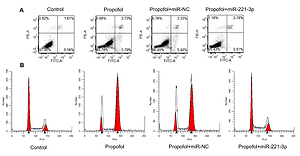Current issue
Archive
Manuscripts accepted
About the Journal
Editorial office
Editorial board
Section Editors
Abstracting and indexing
Subscription
Contact
Ethical standards and procedures
Most read articles
Instructions for authors
Article Processing Charge (APC)
Regulations of paying article processing charge (APC)
NEUROLOGY / EXPERIMENTAL RESEARCH
Overexpression of miR-221-3p affects cell proliferation, apoptosis and inflammation by targeting toll-like receptor 4 in propofol-induced rat astrocytes
1
Department of Anesthesiology, China-Japan Union Hospital of Jilin University, Changchun City, Jilin Province, P.R. China
Submission date: 2021-03-01
Final revision date: 2021-07-01
Acceptance date: 2021-07-21
Online publication date: 2021-08-13
Corresponding author
Shanshan Yu
Department of Anesthesiology, China-Japan Union Hospital of Jilin University, 126 Xiantai Street, Changchun City, Jilin Province 130033, P.R. China, Phone: 86-431-84995481, Fax: 86-431-84995481
Department of Anesthesiology, China-Japan Union Hospital of Jilin University, 126 Xiantai Street, Changchun City, Jilin Province 130033, P.R. China, Phone: 86-431-84995481, Fax: 86-431-84995481
KEYWORDS
TOPICS
ABSTRACT
Introduction:
Growing evidence indicates that propofol has neurotoxic effects on the brains of developing rodents, leading to neuronal cell death, neurodegeneration, and brain injury. Also, microarray data indicated that the miR-221-3p in mRNA and protein expression levels were negatively altered in propofol-treated rat astrocytes; however, the effect of miR-221-3p on propofol-treated astrocytes remains unclear. Thus, we aimed to evaluate the function and mechanism of miR-221-3p in propofoltreated astrocytes.
Material and methods:
Ectopic miR-221-3p was transfected into rat astrocytes, and the Cell Counting Kit-8 assay and flow cytometry were performed to evaluate cell growth and apoptosis. The mRNA levels of toll-like receptors 4 (TLR4), nuclear factor kappa B, interleukin-6, interleukin-1β, myeloid differentiation primary response 88 (MyD88), caspase-3, caspase-12, STAT3, and GRP78 were detected using quantitative real-time polymerase chain reaction. The proteins of TLR4 and MyD88 were determined using Western blotting. The association between miR-221-3p and TLR4 was measured using the Dual-Luciferase Reporter Assay (Promega Corporation, Wisconsin, USA). Then, siTLR4 was transfected with 293T cells to study the role of TLR4 in astrocytes with propofol treatment.
Results:
The miR-221-3p expression in rat astrocytes was markedly suppressed by propofol treatment. The miR-221-3p mimic transfection in propofoltreated astrocytes effectively reduced the suppressive effect of propofol on astrocyte growth, repressed the propofol-induced apoptosis in rat astrocytes, and decreased the cell number during the G2/M phase. The expression of MyD88 and TLR4 was induced by propofol, whereas the transfection of miR-221-3p mimics dramatically reduced expression of these genes at the mRNA and protein expression level. After that, TLR4 was found to be the target of miR-221-3p using the Dual-Luciferase Reporter Assay. Furthermore, knockdown of TLR4 could suppress the apoptosis rate in propofol-treated astrocytes.
Conclusions:
This study revealed that miR-221-3p might prevent astrocytes from propofol-induced damage by targeting TLR4.
Growing evidence indicates that propofol has neurotoxic effects on the brains of developing rodents, leading to neuronal cell death, neurodegeneration, and brain injury. Also, microarray data indicated that the miR-221-3p in mRNA and protein expression levels were negatively altered in propofol-treated rat astrocytes; however, the effect of miR-221-3p on propofol-treated astrocytes remains unclear. Thus, we aimed to evaluate the function and mechanism of miR-221-3p in propofoltreated astrocytes.
Material and methods:
Ectopic miR-221-3p was transfected into rat astrocytes, and the Cell Counting Kit-8 assay and flow cytometry were performed to evaluate cell growth and apoptosis. The mRNA levels of toll-like receptors 4 (TLR4), nuclear factor kappa B, interleukin-6, interleukin-1β, myeloid differentiation primary response 88 (MyD88), caspase-3, caspase-12, STAT3, and GRP78 were detected using quantitative real-time polymerase chain reaction. The proteins of TLR4 and MyD88 were determined using Western blotting. The association between miR-221-3p and TLR4 was measured using the Dual-Luciferase Reporter Assay (Promega Corporation, Wisconsin, USA). Then, siTLR4 was transfected with 293T cells to study the role of TLR4 in astrocytes with propofol treatment.
Results:
The miR-221-3p expression in rat astrocytes was markedly suppressed by propofol treatment. The miR-221-3p mimic transfection in propofoltreated astrocytes effectively reduced the suppressive effect of propofol on astrocyte growth, repressed the propofol-induced apoptosis in rat astrocytes, and decreased the cell number during the G2/M phase. The expression of MyD88 and TLR4 was induced by propofol, whereas the transfection of miR-221-3p mimics dramatically reduced expression of these genes at the mRNA and protein expression level. After that, TLR4 was found to be the target of miR-221-3p using the Dual-Luciferase Reporter Assay. Furthermore, knockdown of TLR4 could suppress the apoptosis rate in propofol-treated astrocytes.
Conclusions:
This study revealed that miR-221-3p might prevent astrocytes from propofol-induced damage by targeting TLR4.
Share
RELATED ARTICLE
We process personal data collected when visiting the website. The function of obtaining information about users and their behavior is carried out by voluntarily entered information in forms and saving cookies in end devices. Data, including cookies, are used to provide services, improve the user experience and to analyze the traffic in accordance with the Privacy policy. Data are also collected and processed by Google Analytics tool (more).
You can change cookies settings in your browser. Restricted use of cookies in the browser configuration may affect some functionalities of the website.
You can change cookies settings in your browser. Restricted use of cookies in the browser configuration may affect some functionalities of the website.



